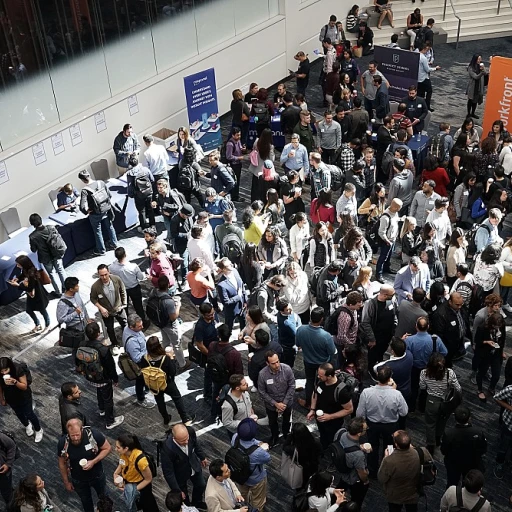
The Rise of AI in the Workplace
Artificial Intelligence Reshaping Work Environments
Artificial intelligence, often referred to as AI, is undeniably taking center stage when it comes to digital trends in the workplace. You might have noticed that the conversation regarding AI isn't new, yet its prominence and application have surged dramatically in the last few years. As of October, the integration of AI into daily work tech continues to advance, impacting various sectors and industries. The most significant way AI is influencing work is through automation. Businesses are increasingly turning to AI to perform repetitive and time-consuming tasks. This trend not only boosts efficiency but also allows employees to focus on more strategic and creative roles. The sector has seen substantial growth from years ago when AI was simply a buzzword to now being a fundamental driver of tech innovation. A notable example in the industry is the development of AI-powered analytics programs. These tools process vast amounts of data in real time, helping organizations make informed decisions faster than ever before. Similarly, AI's role in enhancing social media strategies, by analyzing trends and customer preferences, is gaining traction. It's also worth mentioning AI's impact on mental health in workplaces. Tech companies are working on AI programs designed to monitor and improve employee wellbeing, addressing potential issues before they escalate. This is part of a larger initiative to use technology trends responsibly and sustainably. Social media platforms are leveraging AI to battle misinformation and enhance user experience. Climate change and AI discussions are overlapping too, with efforts to utilize AI in predicting environmental impacts and guiding sustainable practices. The AI revolution is far from over. As we look forward to upcoming developments in the next year, it's clear that its role in work tech is set to expand further. For more insights into how technology is evolving within industries, you might find technological advances in heat treatment an interesting read.Remote Work Technologies: What's New?
Advancements in Remote Work Tools
The landscape of remote work is undergoing rapid transformation, driven by continual advancements in technology and the need for businesses to adapt to changing work environments. Innovations in this space are not just about connectivity but also about enhancing productivity, collaboration, and overall mental health of employees working from varied locations.
In recent months, particularly from March to October, there has been notable progress reported in digital trends for remote work tools. The news is filled with developments in cloud-based platforms that offer real-time collaboration features, making it easier for teams spread across the globe, or even in the United States, to work seamlessly together. Notably, strides in video conferencing technology have been significant, with most platforms now offering improved audio-video quality, even on low bandwidth, ensuring that virtual communication remains clear irrespective of geographic location.
Moreover, several tech giants are embedding artificial intelligence into workplace tools. AI can now analyze behavioral data to offer insights into productivity and suggest ways to enhance workflows. As businesses adjust to a digital-first world, these tools are instrumental in maintaining efficiency and supporting employee well-being.
Digital collaboration platforms have also integrated with various social media channels. This integration allows for easier sharing of ideas and trends, fostering a culture of innovation. With trends technology evolving year by year, platforms continue to tailor their features to users' preferred languages and regions, ensuring inclusivity at all levels.
Furthermore, the rise of 5G technology is set to bolster these remote work tools by offering faster, more reliable internet connections. This increased connectivity can enhance cloud service functionalities, allowing for smoother interactions and boosted productivity.
As these technology trends evolve, the need for innovative approaches in integrating these tools while remaining cyber secure is paramount. Businesses must stay vigilant against potential cybersecurity threats, especially with many relying on third-party services to keep operations running smoothly.
Overall, the rapid evolution of remote work technologies is reshaping how businesses operate, making it essential for industries to remain aware of these trends to adapt adeptly.
Cybersecurity Challenges in Modern Work Tech
Addressing Cyber Threats in the Evolving Digital Workspace
In the dynamic landscape of digital trends, cybersecurity remains a pressing challenge for businesses and individuals alike. As the adoption of cloud-based technologies and remote work solutions continues to grow, many organizations find themselves grappling with an increasing number of cyber threats. This surge can be attributed, in part, to the rapid digital transformation that industries have experienced over the past few years, from January to December, as well as breakthrough innovations in tech.
According to industry experts, the advent of technologies like artificial intelligence and real-time data analytics, while beneficial, also pose significant cybersecurity risks. These advanced solutions often require stringent protective measures to fend off potential data breaches and cyberattacks. Furthermore, as digital communication tools and platforms flourish, info-security professionals face the challenge of securing sensitive information shared across these channels, such as on social media and audio-video conferencing tools.
It is imperative that companies remain vigilant and proactive. Investing in robust cybersecurity infrastructure is no longer an option but a necessity. Organizations should adopt an integrated approach that addresses threats effectively, safeguarding both their digital assets and their employees' mental well-being.
As news on cybersecurity incidents continues to unfold, including insights from the United States, South Africa, and the tech sector alike, the conversation around tech security evolves. Whether considering the security implications of Google's latest unveilings or preparing for the data privacy risks that new technology trends might introduce, staying informed is key.
The digital industry can draw lessons from past incidents, such as the challenges faced during August to October periods, enhancing the overall security measures in place. As with the climate change discourse shaping business discussions, cybersecurity requires long-term strategies, emphasizing sustainable and effective solutions.
The Impact of 5G on Work Tech
The Influence of 5G on Contemporary Workplace Technologies
With the digital trends rapidly evolving, one notable tech advancement that continues to shape modern work environments is the deployment of 5G technology. Standing prominently in the tech news since March, the roll-out is increasingly considered a game changer for businesses and industries, featuring prominently amidst August discussions. 5G technology boasts increased speed, reduced latency, and enhanced connectivity which, unlike its predecessors, has a profound impact on the way businesses operate. With real-time data processing becoming feasible, industries are now exploring cloud-based systems, transforming workflows and driving innovation across numerous sectors. This shift also enhances the integration of artificial intelligence in the workplace, facilitating smarter, highly efficient environments. Moreover, the influence of 5G extends to remote work technologies, altering how people engage with digital tools and platforms. While previous years relied heavily on traditional internet infrastructures, 5G provides a seamless experience by supporting advanced capabilities like audio video conferencing tools, thereby promoting business continuity even in decentralized arrangements. From a cybersecurity perspective, however, this advancement presents novel challenges. As data exchange becomes faster and more prevalent, maintaining security standards and ensuring the privacy of digital assets becomes a priority for companies. With these developments, emphasis on robust cybersecurity becomes more critical, aligning with the ongoing industry focus seen throughout the year, particularly in the United States. The health sector, notably impacted by recent trends, stands to benefit from real-time data analytics empowered by 5G, supporting initiatives like telemedicine and remote monitoring. Despite the promising tech potential, these advancements come with responsibilities about privacy, preferred language adaptations, and mitigating climate change impacts. As we venture further into the digital realm enhanced by 5G capabilities, understanding the balance between advancement and potential risks will remain a key consideration for organizations aiming to thrive in the swiftly changing landscape of digital workspaces.Sustainability in Tech: A Growing Trend
Tech Goes Green: The Movement Towards Eco-friendly Workplaces
Amidst the rapid advancements in digital technology, a significant shift towards sustainability is taking center stage. This growing trend is not only influencing how technology is developed but also how businesses and individuals engage with it. As companies across the globe become more aware of their environmental impact, the demand for sustainable tech solutions is on the rise. Here's a look at how this trend is shaping the industry:- Energy-Efficient Hardware: Companies are increasingly opting for energy-efficient computers and servers that minimize power consumption and carbon footprint, playing a crucial role in reducing overall energy use.
- Cloud-Based Solutions: Cloud computing is evolving to include more sustainable practices. By optimizing energy consumption and utilizing servers more efficiently, cloud service providers are steadily moving towards greener operations.
- Digital Workspace Innovations: Remote work technologies are being optimized to not only improve productivity but also decrease the reliance on physical infrastructure, thus reducing emissions associated with office buildings.
Future Predictions: What's Next for Work Tech?
Future Directions: Insights on Emerging Work Tech
As we navigate the evolving landscape of work technology, it's crucial to consider what lies ahead in this rapidly advancing field. The trends observed in digital tech news from October and throughout this year offer a glimpse into the broader shifts in the industry.
Shifts in Artificial Intelligence
Artificial intelligence continues to make significant strides, forging new paths in the workplace. As discussed previously, AI's rise is transforming business operations; it promises even deeper integration into daily tasks. Future updates might focus on refining AI with a stronger emphasis on user preference and health considerations.
Enhancements in Remote Work Technology
Remote work technologies are becoming more sophisticated, with recent trends indicating a move toward creating a seamless, cloud-based experience for users. Upcoming advancements could focus on incorporating real-time data analytics to improve productivity and mental health support for remote workers.
Addressing Cybersecurity in the Digital Age
With the increasing reliance on digital platforms, cybersecurity remains a top priority. Future developments will likely focus on addressing threats associated with new technology trends, leveraging third-party partnerships to enhance security measures.
The Role of 5G in Real-Time Connectivity
The deployment of 5G technology is set to revolutionize connectivity within work tech. As comprehended in the recent research, businesses are expected to utilize 5G to enhance their digital infrastructure, ensuring faster communication and more reliable video and audio streaming capabilities.
Integrating Sustainability in Tech Development
Sustainability is becoming a central theme within the tech industry, driven by the urgency of climate change. Future initiatives will likely prioritize eco-friendly practices, evolving into a standard for tech development.
These insights represent potential pathways within the ever-changing domain of work technology. As the industry evolves, keeping abreast of these trends and leveraging them effectively will be key to navigating the future landscape successfully.











